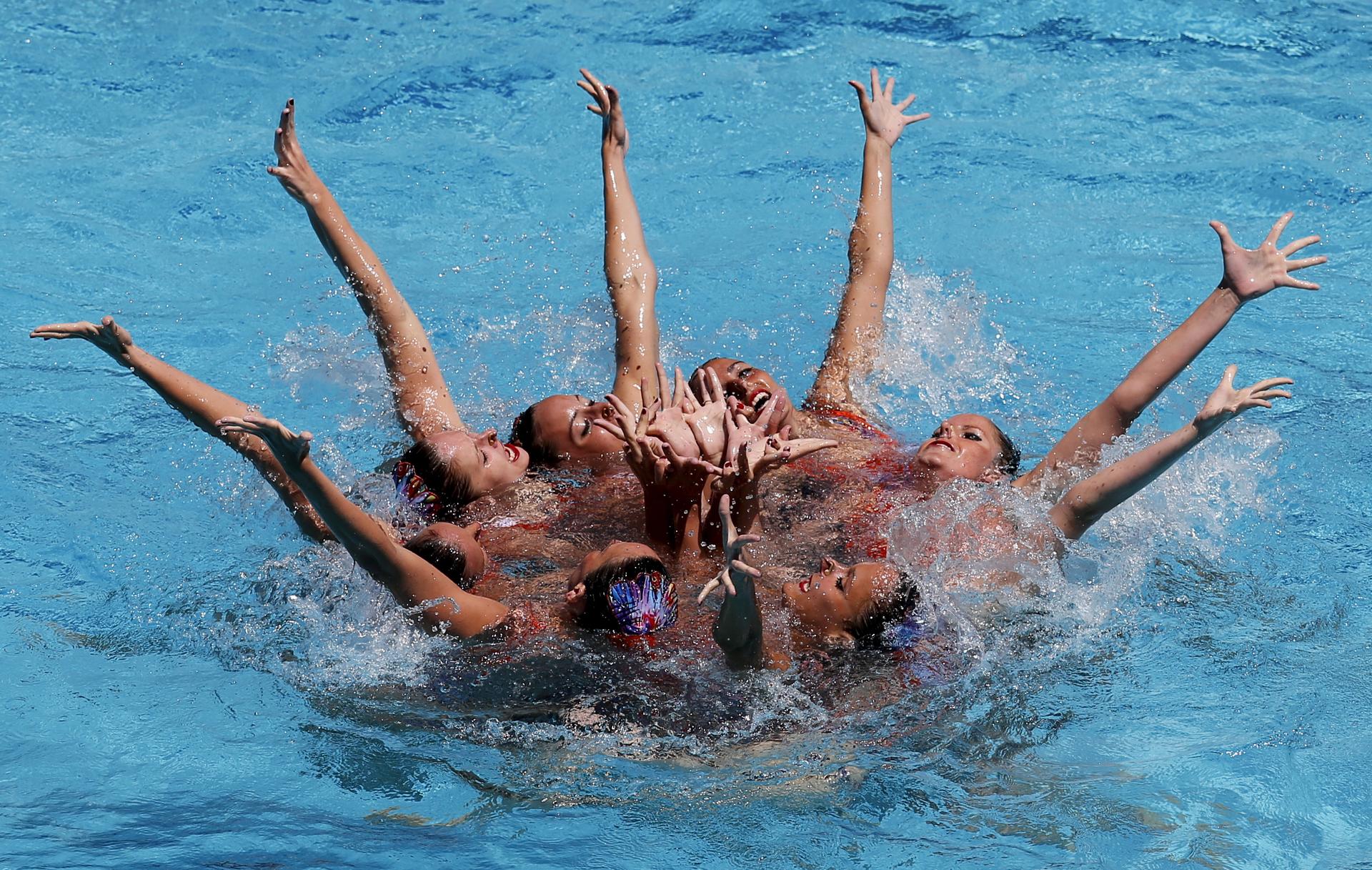If pollution doesn’t ruin Brazil’s Olympics, will the political drama?
Spain competes in a synchronized swimming Olympic qualification tournament in Rio de Janeiro, Brazil.
RIO DE JANEIRO, Brazil — Come to Brazil! Land of Zika, political chaos, spiking inflation, a plummeting economy, and riotous protests.
It has not exactly been a great marketing campaign for South America’s largest country, which will host the summer Olympic Games in just four months. And after the recent political circus, those planning to attend the games could be forgiven for wondering if Brazil is about to fall apart at the seams.
Brazil’s president, Dilma Rousseff, is in increasing danger of being impeached. Her attempt to install her predecessor, Luiz Inacio Lula da Silva, in her cabinet was blocked by a judge, who says it’s an illegal attempt to protect the former leader from criminal investigations. Dozens of the nation’s top politicians and businessmen are being investigated or have been arrested or jailed. Meanwhile, the health care system is under strain as physicians study birth defect cases that may be linked to the Zika virus.
It’s a real mess.
But there’s no need to panic. Despite the multiple crises raining down on the country, its key institutions — the political system, military and economy — should survive intact and could even emerge stronger, say several analysts who watch the world’s fifth most populous country.
Here’s what three of those experts had to say about the recent mayhem and whether it might impact the Summer Games.
Joao Augusto de Castro Neves, director of Latin America at the Eurasia Group consultancy:
De Castro Neves doesn’t think there’s much of a chance recent events will lead to a military coup or any other form of widespread unrest.
“We don’t think it’s going to lead to social chaos, or significant social turmoil,” he says.
And even if Rousseff’s government falls, the Olympics are a fairly self-sustaining event that relies more on Rio de Janeiro’s state and city governments than Brazil’s increasingly unstable federal government, de Castro Neves says.
“This is a city that has experience in hosting international events. Even if you have a power vacuum or a turnover in the government, the odds that that will derail the organization of the Olympics is very slim.”
Riordan Roett, director of the Latin American Studies Program at Johns Hopkins University:
Roett, who previously spent years living and working in Brazil, says now is not the ideal time to visit this troubled country: “Between Zika and political instability and economic collapse, I wouldn’t want to spend much time in Rio this summer.”
But that’s Roett’s subjective viewpoint. Looking more objectively at the current political and economic situation, he says there’s no reason to expect the country won’t survive the current instability with ease.
“This is a period of uncertainty, not crisis. Brazilians deal with problems like this very well,” he says. “The constitution is more or less respected, there’s an independent judiciary, which is critical and will be the bedrock of whatever transition takes place.”
It is these fundamental institutions that analysts keep coming back to in discussing the future of Brazil. While the system is under stress right now, there are no signs the country won’t proceed peacefully toward its next phase of government, without impacting the Olympics, according to Roett.
By August, “Somebody will be running the show,” he says.
Eric Farnsworth, vice president of the Americas Society and Council of the Americas in Washington, DC:
Farnsworth says he has recently been in touch with Rio Olympics organizers, who stressed that the event is definitely going ahead despite the multiple crises in Brazil.
That echoes statements by Brazilian politicians including Sports Minister George Hilton, who told reporters last month that canceling the event is “not in discussion.”
What will be impacted, Farnsworth says, is what he calls the “atmospherics” of the games — the public perception of the Olympics and the impression that visitors to the country will take home with them.
“The Olympics were meant to be Brazil’s coming out party,” he says. “The world would come to the Olympics and would celebrate a new Brazil, would see a new face of a country that was confident and outward-looking and building its global reputation.”
Even before visitors arrive, Brazil’s and Rio’s reputations are already taking a beating. Infrastructure projects that were supposed to ease Rio’s terrible congestion are delayed, and the Olympic budget has been slashed. Then there are the concerns over Rio’s sewage-infested Guanabara Bay, a venue for Olympic sailing events.
These things aren’t painting the “Marvelous City” in a very positive light. That could have an impact on how many people ultimately decide to visit Brazil in August.
“Many people may just stay away,” Farnsworth says.
Asked whether Olympic visitors to Rio should be concerned about safety given the worsening economy and political unrest, Farnsworth thinks the opposite is actually true.
“As the games get closer and get put on, the security presence in Rio is going to be very, very prevalent and very visible,” he says. “In some ways, it’ll be safer going to Rio at that time than at other times.”
